Big Red Book
Celebrating television's This Is Your Life
Richard WHITELEY (1943-2005)

THIS IS YOUR LIFE - Richard Whiteley, television presenter and journalist, was surprised by Michael Aspel during a photo shoot on the set of the ITV soap opera Emmerdale.
Richard, who was born in Bradford, studied at Giggleswick School, where, encouraged by his teacher Russell Harty, he became the editor of the school magazine. He later read English at Christ's College, Cambridge, where he became the editor of the university magazine.
He began his television career in 1965 as a trainee with ITN before joining the newly created Yorkshire Television in 1968 as the presenter of the regional news programme Calendar. As the host of the long-running daily game show Countdown, he achieved national fame in November 1982, when the programme launched Channel 4, and he became the first person to be seen on the channel.
"What am I meant to say? God, you've lost some weight!"
programme details...
- Edition No: 970
- Subject No: 945
- Broadcast date: Mon 3 Mar 1997
- Broadcast time: 7.00-7.30pm
- Recorded: Fri 14 Feb 1997
- Venue: Yorkshire Television, Leeds
- Series: 37
- Edition: 23
- Code name: Date
on the guest list...
- Margaret - mother
- Helen - sister
- Sir Paul Fox
- Bruce Gyngell
- Kathryn Apanowicz - partner
- Lisa Riley
- Malandra Burrows
- Billy Hartman
- Christopher Chittell
- Paula Tilbrook
- Ronnie Burnet
- Peter Colman
- Warwick Brookes
- Susan Brookes
- Iain Johnstone
- Austin Mitchell
- Fred Trueman
- Giggleswick School Jazz Choir Filmed tributes:
- Terry Wogan
- Carol Vorderman
- Norman Lamont
- Barbara Taylor Bradford
related appearances...
- Hannah Hauxwell - Mar 1992
- Carol Vorderman - Oct 1997
- Carol Smillie - Sep 1998
- The Night of 1000 Lives - Jan 2000
- Richard Stilgoe - Jun 2001
- David Dickinson - Jan 2003
- Gyles Brandreth - Aug 2003
production team...
- Researcher: Ruth Malone
- Writer: Ian Brown
- Directors: Wendy J Dyer, Paul Kirrage
- Associate Producer: Sue Green
- Executive Producer: John Longley
- Producer: John Graham
- names above in bold indicate subjects of This Is Your Life
celebrating the hosts
Emmerdale's finest
a celebration of a thousand editions

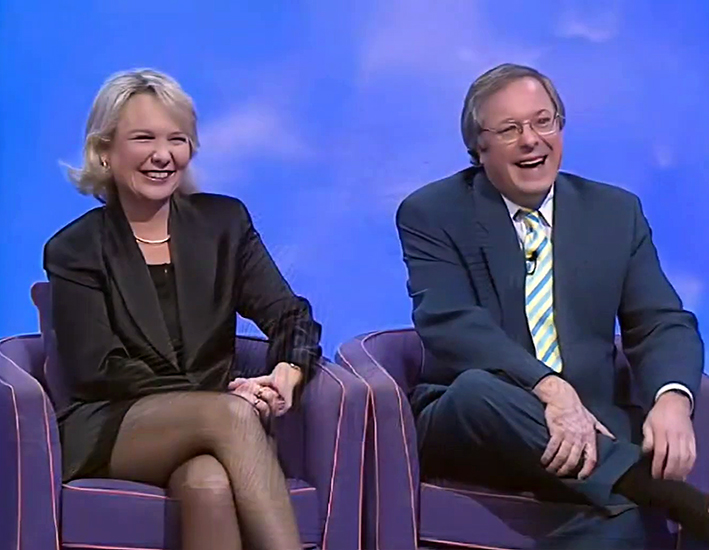


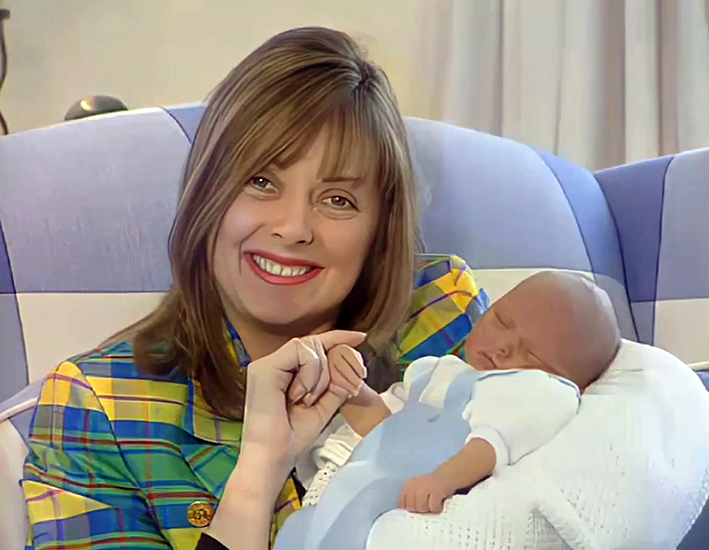
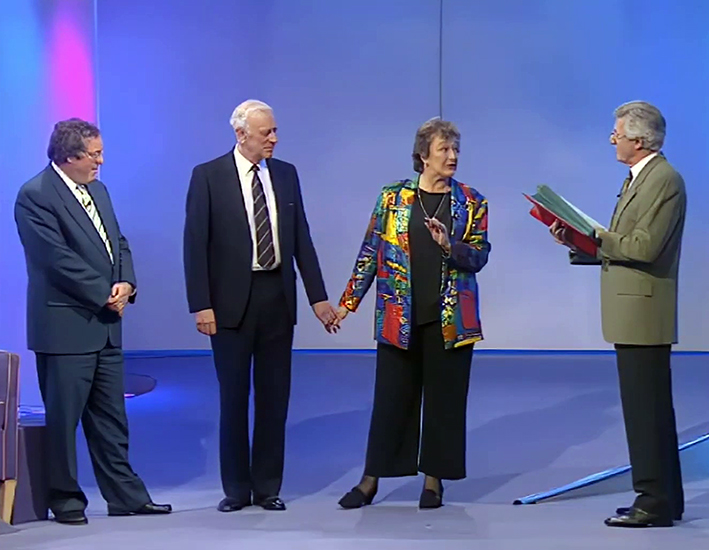

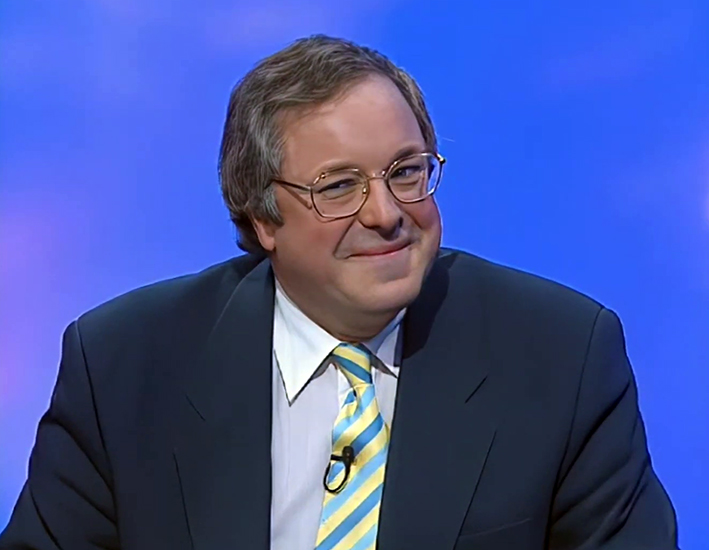
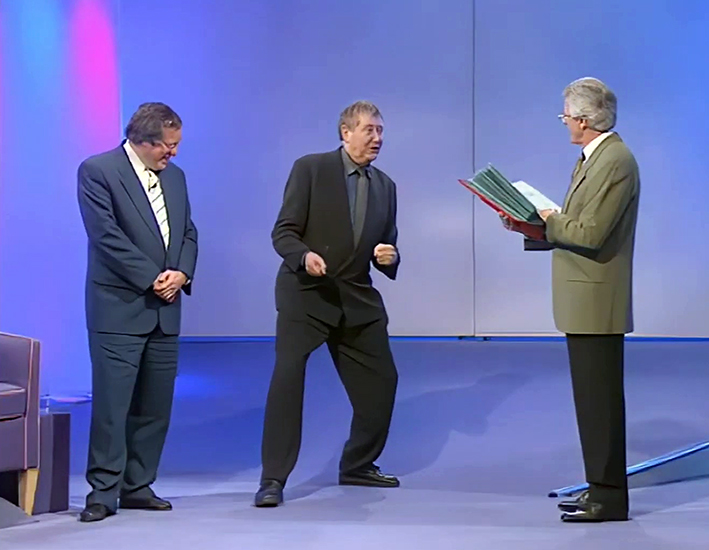
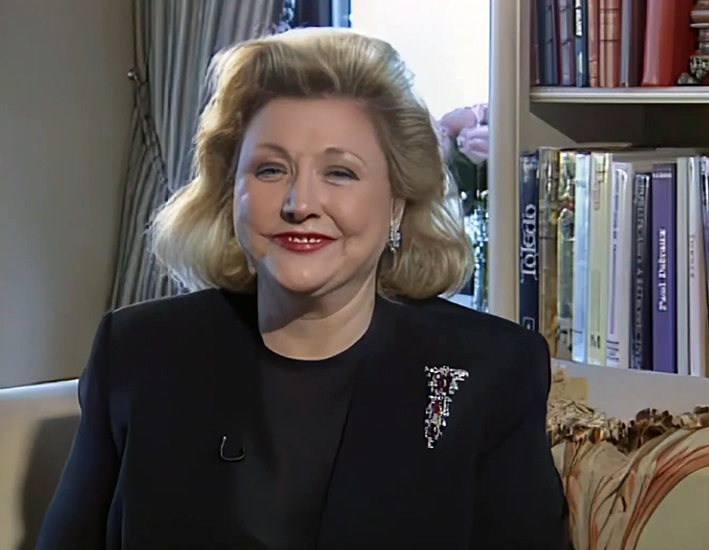
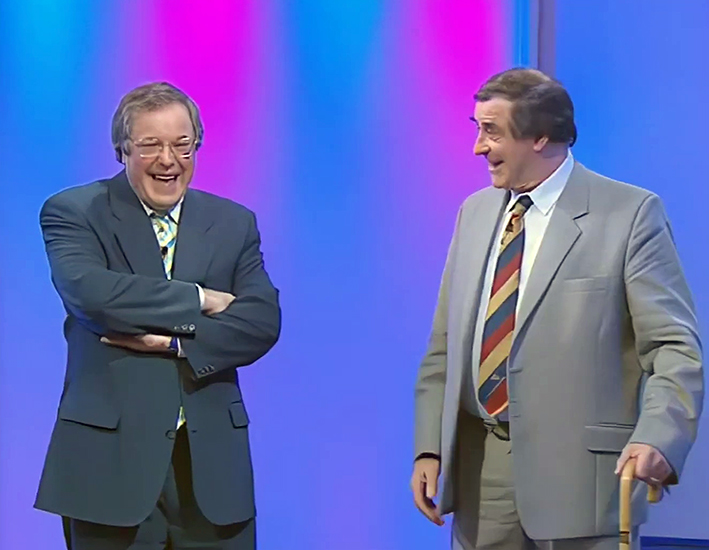

Screenshots of Richard Whiteley This Is Your Life
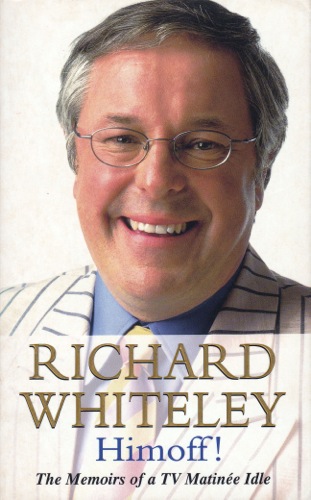
Michael Aspel jumped out at me with the red book when I was supposedly meeting Countdown's biggest fan at, for some reason, the Emmerdale studios. I am always last to smell a rat. Believe me, I would have trouble spotting the Pied Piper if he came to town. Michael picked me up at four-thirty on a Friday. My accomplices, who had brilliantly kept the whole affair totally secret, felt they'd be unable to cancel, on my behalf, a ceremony in memory of Bob Cryer, the Labour MP sadly killed in a car crash. So I went over to Keighley that night, accompanied by two minders, with my heart in my mouth, wondering what was to befall me later on. The recording started at ten-thirty, and the subsequent party, thrown at vast expense by Bruce Gyngell, then the MD of Yorkshire Television, was the best in the thirty years. It's a funny feeling … you look round at all the people, laughing and drinking, and you realise they are only there because of you, and the next time a similar crowd gathers on your behalf and say nice things about you, it will probably be your funeral.
The programme itself starred the two Whiteley women. My mother was due to tell how I had always been fascinated by television, and had made a camera out of a cardboard box, with lavatory rolls as lenses. 'Subject's mother', as the production team charmingly calls such individuals, normally causes headaches, with her inability to remember lines, and general confusion as to why she is there. My own mother was no exception, and apparently staggered her way through rehearsals, getting everything wrong to the frustration of all concerned. 'Subject's mother' was fully living up to expectations. With the programme in full flow, and with me not knowing what was coming next, I had unwittingly volunteered the information to Michael about the cardboard camera, but Michael ploughed on, as per script.
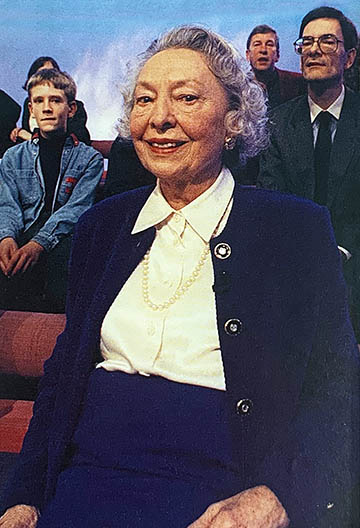
'How did he become interested in TV, Margaret?'
'Well, Michael,' said subject's mother, 'I only had two lines in this show, and Richard has just spoken them.' Cheers and trebles all round in the production gallery. Subject's mother had been hilarious.
Equally funny was the contribution by my sister Helen. Speaking in the posh voice that I recognised she used to reserve for dinner parties in Ilkley with her QC husband's legal bigwigs, she proceeded to tell a tale about Kimi my hamster. Helen and my mother had discovered Kimi cold and stiff in his cage one morning, and presuming him to be dead, my father buried him by a tree trunk in the garden. In the weekly letter to school, I was duly informed of this sad demise. On receipt of the letter, I had, apparently, against all school rules, rushed into the sewing room where we knew there was an unattended phone, and rung home in panic. It was not dead, but hibernating. Dig it up at once … there was no time to lose. Helen told this tale, saying that Kimi was dug up, and put in the Aga (good old Nellie – she always talked us up, we had an Esse). Sure enough, Kimi came to life, and lived to an even riper old age … poor thing. I didn't even have a wheel for him.
Helen told this tale so wittily, and looked so pretty, she was the star of the show. For weeks everybody asked how an ugly old bugger like me could have a sister like that. Well, I agree. She'd have been far better at my job than I am. She had everyone summed up pretty quickly, everyone had a telling nickname, and she would forever dissolve into infectious laughter. Everyone would seek her out at parties, and want to sit next to her at dinner. She gave me hell, I have to say. Hair too long, drank too much, who on earth was I seen with the other night (she missed nothing) and, above all, when would I lose two stone in weight?
She died, at the age of forty-nine of liver cancer, almost a year to the day after the This Is Your Life broadcast. Although I can see the cassette tape from where I am sitting as I write, I can't bear to watch it.
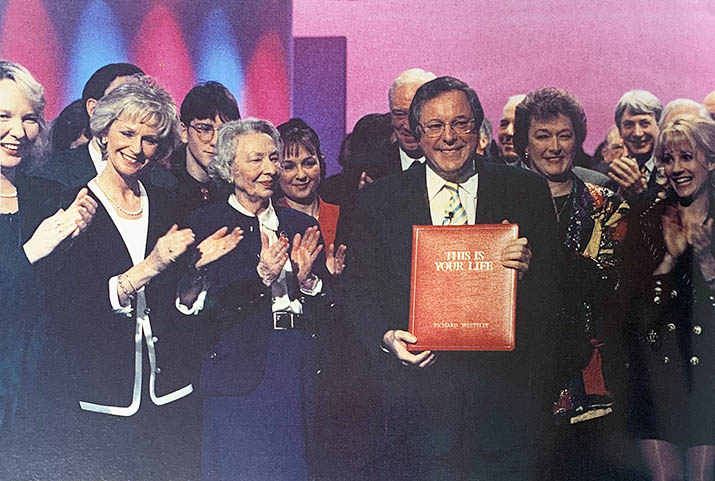

In January 1997 I got a phone call asking me if I was alone. I was. They wanted to do a This Is Your Life on Richard. Would I help them?
I worked closely with the producer figuring out who would be good from family, friends and work colleagues to appear on the show. When I told those involved, it surprised me how much people enjoyed a conspiracy, even when it involved telling some minor white lies to Richard.
The trap was to be a photo shoot on the set of Emmerdale, the long-running Yorkshire soap opera. The idea was a generic advertisement for YTV's two most successful shows. As Richard nonchalantly posed with Malandra and the rest of the Emmerdale girls in Kitty's Tea Rooms, Michael Aspel hove into view with his Big Red Book and remarked: 'Flash, bang, wallop, what a photograph! Can I come and be seen sharing a joke because if you do say "yes" I will then be able to say: "Tonight, Richard Whiteley, this is your life."'
Richard was already committed to attending a ceremony in memory of Bob Cryer the Labour MP who had been killed in a car crash, so the studio recording did not take place until 10.30 at night. Still, that gave the cast plenty of time to rehearse, twice with a stand-in and once with the great Aspel himself.
It was decided that Richard's mother, Margaret, should not be put through the ordeal of stepping through the portal and delivering her piece standing up. Instead, from her seat, she would reveal that her son was passionate about television as a child, from the time in 1952 when they got a Ferguson TV, and he always wanted to be a cameraman.
Terry Wogan, on tape, got the proceedings rolling. 'Richard Whiteley. The oldest man on Channel 4. The doyen of quiz shows. Dear old boy who in all those years is still the same – same jokes, same flushed appearance, same Carol. "Ferret, please, Carol" – goes out the cry. And then you meet somebody who's been watching Countdown and they say, "Did you watch Countdown this week?" and you say, "Yes I did." "And how was Richard Whiteley – no improvement?"'
Michael asked Richard why he didn't follow his father into textiles and he replied: 'Well, like a lot of kids of my age – we got a TV in 1952, a purple screen, a Ferguson, a 12-inch – just before the Coronation and I was nine and I was fascinated by television and I always wanted to work in television – I wanted to be a cameraman and had no interest in textiles really and just was keen on telly.'
Aspel then moved over to his mother. 'And Margaret, young Richard was bowled over by the telly.'
'Yes he was,' she agreed and then announced inimitably: 'And may I just say I only had three lines to say and he's said them.'
The studio collapsed in laughter.
Michael persisted: 'But will you tell us about what he did as a small boy – how did his love of cameras manifest itself?'
Margaret: 'Oh, well, he used to make cameras from cardboard boxes, and earphones – so he was destined for TV.'
In fact Whiteley, mere et fille, pretty well stole the evening, with Helen telling the dead hamster story.
'When he went to Giggleswick, he had to leave a rather scrawny looking hamster behind called Kimmy, and he made me look after it. For weeks and weeks I fed and watered this funny-looking animal. Till one day I went to his hutch and, low and behold, there was poor Kimmy curled up in a ball, stone cold and definitely stiff. So mother wrote to Richard and said unfortunately we have some sad news, Kimmy is no longer with us but we've found a nice spot for him in the garden so all is well. Anyway the next day Richard got special permission by his house master to phone home. This frantic voice at the other end of the phone said – "Kimmy is not dead, dig him up, he's hibernating." So we duly dug the poor hamster up who meanwhile had been underground for three days, wrapped him in swaddling clothes and put him on the top of the Aga. He took two days to come round and he lived for another two years.'
The evening ended with the Yorkshire legend, the late Fred Trueman, telling an impenetrable story and the Giggleswick School jazz singers serenading us with 'Who Could Ask For Anything More?'
At the after-show party Bruce Gyngell, the new Managing Director, transformed the wine into good champagne with a wave of the YTV company cheque book and Richard told the assembled throng as he toasted them that this was the best party that Yorkshire Television had thrown in 30 years. 'It's a funny feeling' he said, 'you look around at all the people, laughing and drinking, and you realise that they are only there because of you, and the next time a similar crowd gather on your behalf and say nice things about you, it will probably be your funeral.'
Series 37 subjects
Steve Redgrave | Gary Rhodes | Toyah Willcox | Freddie Young | John Motson | Jeremy Clarkson | John Rands | Jill DandoDon Black | Sue Nicholls | Lynn Redgrave | Tanni Grey | Noddy Holder | Thora Hird | Richard Madeley and Judy Finnigan
Sam Torrance | John Simpson | Elizabeth Ward | Ross Kemp | Julian Bream | Les Dennis | Nigel Davenport
Richard Whiteley | Justin Hayward | Sian Phillips | Chris Tarrant